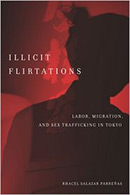Illicit Flirtations: Labor, Migration, and Sex Trafficking in Tokyo

Author: Rhacel Salazar Parrenas
Publisher: Stanford, CA: Stanford University Press, 2011. 325p.
Reviewer: Ko-lin Chin | November 2012
The massive arrival of Filipina hostesses in Japan in the early 2000s was often cited by antitrafficking crusaders as proof that large numbers of young, innocent women from poor countries were trafficked to rich countries and forced to engage in prostitution. According to the crusaders, the stages of sex trafficking could be divided into (1) the recruitment of potential victims by recruiters, (2) the transportation of victims by traffickers, (3) the selling of victims to sex venue owners by recruiters or traffickers, (4) the control of, and subsequent (5) victimization of victims by sex ring operators, (6) the use of debt-bondage as a form of control, and (7) the financial exploitation of the victims. The crusaders also argued that most sex trafficking offenders are members of organized crime groups. Consequently, for more than a decade the world community, under the leadership of the U.S. government, has developed many measures to combat sex trafficking, even though the above claims about sex trafficking have never been supported by grounded empirical research.
In Illicit Flirtations: Labor, Migration, and Sex Trafficking in Tokyo, sociologist Rhacel Slazar Parrenas from the University of Southern California challenges most of the claims of the prevailing antitrafficking paradigm and argues that measures adopted by government agencies to stop trafficking actually hurt the women involved by denying them an opportunity to go overseas to work and lift themselves and their families out of abject poverty. Instead, according to the author, sending and receiving governments should treat these women as contract workers, not victims to be rescued, and help them to gain control of their labor and migration.
In 2005 and 2006, as a visiting professor at Ochanomizu University in Japan, Parrenas engaged in ethnographic fieldwork in Tokyo, spending time with fifty-six Filipina hostesses: forty-five females and eleven transgender individuals. In Japan, a hostess is not necessarily engaged in paid sex; Professor Parrenas, herself, worked briefly as a hostess in a club controlled by a yakuza (Japanese organized crime) group. The relationship between prostitution and sex trafficking is, by its nature, a difficult subject to study, but Parrenas did an excellent job in combining field interviews with participant observation to obtain rich and reliable data from her research subjects. The result is a highly readable and informative book filled with firsthand accounts of the work and lives of Filipina hostesses in Tokyo.
Parrenas’ book is based not only on rich, empirical data, but also on a solid theoretical framework. She suggests that, in order to avoid labeling Filipina entertainers in Japan as either free subject (migrant) or enslaved subject (trafficked person), we should consider the process of their transnational movement as indentured mobility, so that we can capture the complex dynamics of coercion and choice, or subjugation and progress. Under this framework, the author questions the labeling of Filipina hostesses as trafficked persons, but at the same time refuses to dismiss their vulnerability to forced labor.
Most books on sex trafficking, regardless of whether they support or reject the dominant antitrafficking paradigm, rarely provide a nuanced understanding of the experiences of the women who engage in commercial sex overseas. Illicit Flirtations is the exception. In the book, the author portrays in extensive detail the social organization of the migration process, the nature of servitude, and other vulnerabilities of migration. Through the discussions of class, shimei (request for a hostess’ company), dohan (paid date), table rotation, show time, surface acting, sales quota, and many other norms or practices associated with Filipina hostess clubs, Parrenas describes how hostesses engaged in illicit flirtations in a labor system that was set up to buttress the masculinity of its clients. Parrenas argues that, even though some hostesses did have sex with their clients, they did not view themselves as prostitutes because they slept only with regular customers they actually liked and there was no cash exchange right after the sexual act. According to Parrenas, contrary to what has been reported in the media and the antitrafficking literature, hostess clubs in Japan are by no means brothels, and the Filipina women working in them are not really prostitutes.
Parrenas observes that hostesses and hostess clubs in Japan have different moral boundaries or regimes, such as moral conservatives, amoralists, and moral in-betweeners. Morally conservative hostesses maintain only platonic relations with their customers, amoralists willingly participate in the direct purchase of sex, and the in-betweeners fall between the above two extreme groups and have sex only with frequent customers who pay them indirectly. In morally conservative hostess clubs, physical contact between customers and hostesses is kept to a minimum; at clubs with a moral in-between regime, the sexual flirtation that takes place is generally meek, whereas in amoral businesses, customers can pay for sex with hostesses. Parrenas makes a good point when she writes: " ‘Sex trafficking’ becomes an issue when hostesses find themselves working in a club where the moral regime of sex does not match their own. For instance, a moral conservative working at an amoral club is likely to confront serious moral violations at work. Aggravating this situation would be their immigrant status. Arubaito [long-term legal residents] workers could reject peer pressure and quit. Talents, as contract workers [with entertainer visas], unfortunately have less flexibility to do so."
Recently, a number of scholars have begun to question some of the core assumptions and beliefs that have provided the foundation for most of the current antitrafficking policy. Among those works that are critical of the antitrafficking discourse, Parrenas’ book is probably one of the more convincing because it is based on rich, solid field data and on a careful analysis that hinges on the experiences and perceptions of Filipina hostesses. This book undoubtedly makes a major contribution to our understanding of the relationship between hostessing, prostitution, and sex trafficking.
Ko-lin Chin is a Professor at the School of Criminal Justice, Rutgers University.


